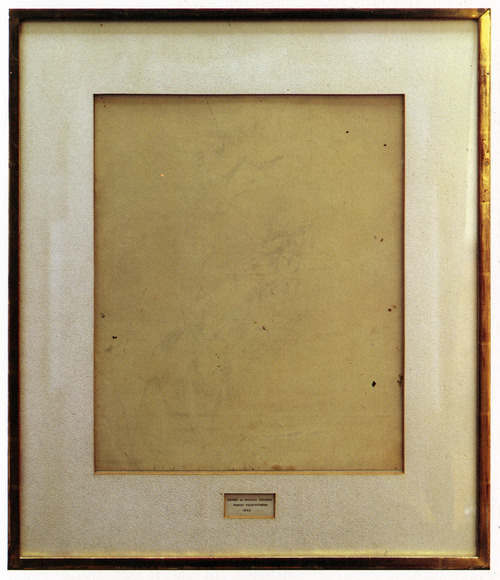 |
| Robert Rauschenberg's "Erased de Kooning Drawing" (1953) |
For our next project, we'll be working with two parallel forces — creation and destruction — to produce a finished poem.
The first step will involve making a short recording of improvised speech (or singing, or freestyling — basically you making words however you'd like), which you'll then process. Ninety seconds might be an ideal length but feel free to do more or less as you prefer. In any case, set the time frame and stick to it.
You should only record one take and fill that time with as much or as little speech as you'd like. Perhaps you'll try to work out a new poem you haven't yet written or recall an old one from memory; maybe you'll make a to-do list or tell a story, talk to a friend, talk to yourself, string together stream-of-consciousness associations, or make one straightforward statement. In any case, once you're done, transcribe what you've recorded.
Now the second step of the project commences. Using your complete transcription as a source text that you'll break down via the process of erasure to yield a final text, not unlike how a sculptor begins with a block of marble and chips it away a little bit at a time to create their finished piece. You can cut as much or as little as you'd like, and can remove words in complete units (i.e. clauses, sentences, paragraphs) or individual words (or even letters). That is to say that your final piece will be as cohesive (or deconstructive) as you want it to be. You might choose to work in Word itself, deleting text as you desire, or with a print-out of the document, using a Sharpie, Wite-out, scissors, drops of paint, etc. and then retranscribe the results into Word.
Before we get to specifications for this assignment, a few precedents and contexts: Wave Poetry is a publisher with a serious interest in the erasure technique and they've gone so far as to produce an erasure engine that allows visitors to make their own texts from sources as diverse as Melville's Moby Dick, Kant's The Critique of Practical Reasoning, and Aristophanes' The Clouds. Other poets using this technique include Joseph Massey and Mary Ruefele, and one of the ur-texts in this genre is Tom Phillips' A Humument — a book-length text created by "treating" a Victorian novel, A Human Document. As for improvisation and transcription, those techniques are at the heart of poet David Antin's practice: his published works begin as spontaneously-generated talks in various locations, which are recorded, transcribed, and lightly-edited to yield their final versions.
Your responses to this prompt should be written texts texts (ideally in Word format) of a reasonable length (~1 page) and should be e-mailed out no later than our class meeting on Monday, October 5th. If our class stays on schedule, we should be workshopping these pieces from October 9–14, taking us up to the fall reading days.

No comments:
Post a Comment